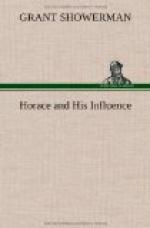The reason for this is that in Horace we have, above all, a person. No poet speaks from the page with greater directness, no poet establishes so easily and so completely the personal relation with the reader, no poet is remembered so much as if he were a friend in the flesh. In this respect, Horace among poets is a parallel to Thackeray in the field of the novel. What the letters of Cicero are to the intrigue and turmoil of politics, war, and the minor joys and sorrows of private and social life in the last days of the Republic, the lyrics and “Conversations” of Horace are to the mood of the philosophic mind of the early Empire. Both are lights which afford us a clear view of interiors otherwise but faintly illuminated. They are priceless interpreters of their times. In modern times, we make environment interpret the poet. We understand a Tennyson, a Milton, or even a Shakespeare, from our knowledge of the world in which he lived. In the case of antiquity, the process is reversed. We reconstruct the times of Caesar and Augustus from fortunate acquaintance with two of the most representative men who ever possessed the gift of literary genius.
It is because Horace’s appeal depends so largely upon his qualities as a person that our interpretation of him must center about his personal traits. We shall re-present to the imagination his personal appearance. We shall account for the personal qualities which contributed to the poetic gift that set him apart as the interpreter of the age to his own and succeeding generations. We shall observe the natural sympathy with men and things by reason of which he reflects with peculiar faithfulness the life of city and country. We shall become acquainted with the thoughts and the moods of a mind and heart that were nicely sensitive to sight and sound and personal contact. We shall hear what the poet has to say of himself not only as a member of the human family, but as the user of the pen.
This interpretation of Horace as person and poet will be best attempted from his own work, and best expressed in his own phrase. The pages which follow are a manner of Horatian mosaic. They contain little not said or suggested by the poet himself.
1. Horace the person
Horace was of slight stature among even a slight-statured race. At the period when we like him best, when he was growing mellower and better with advancing years, his black hair was more than evenly mingled with grey. The naturally dark and probably not too finely-textured skin of face and expansive forehead was deepened by the friendly breezes of both city and country to the vigorous golden brown of the Italian. Feature and eye held the mirror up to a spirit quick to anger but plenteous in good-nature. Altogether, Horace was a short, rotund man, smiling but serious, of nothing very remarkable either in appearance or in manner, and with a look of the plain citizen. Of all the ancients who have left no material likeness, he is the least difficult to know in person.




